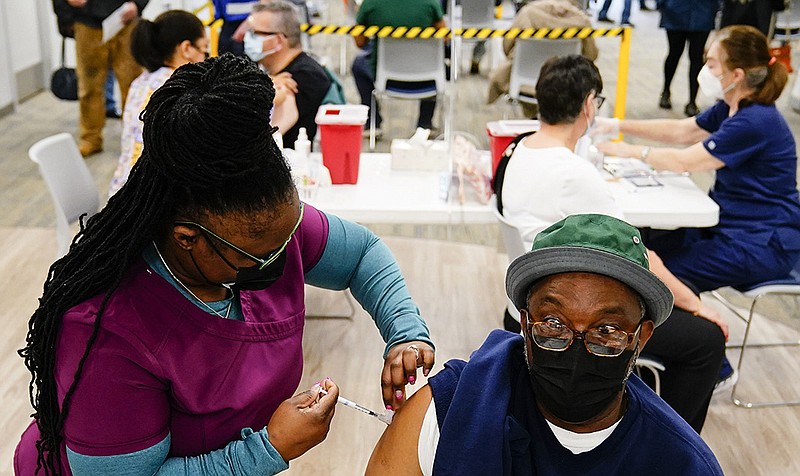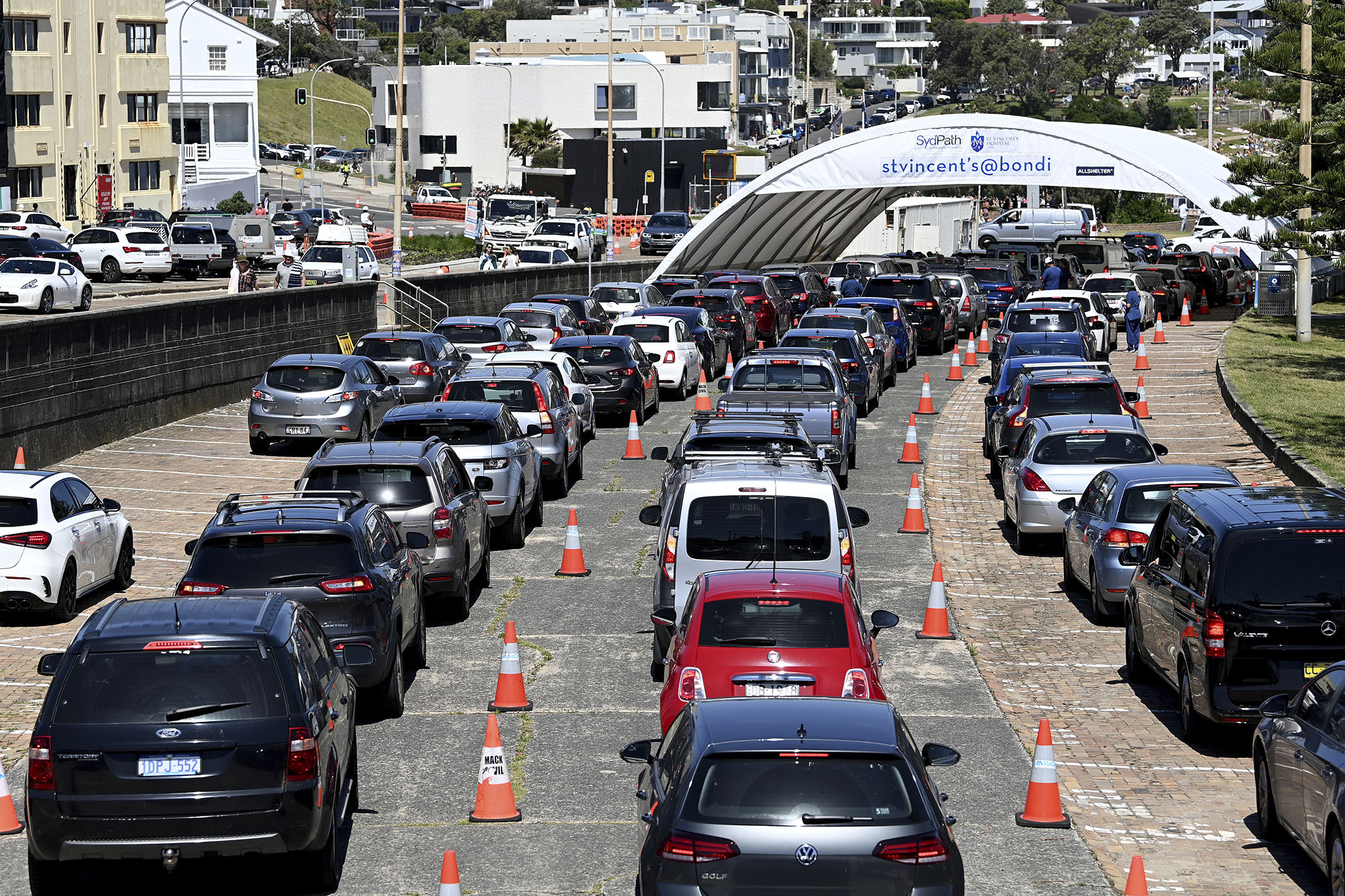Anthony Fauci, director of the National Institute of Allergy and Infectious Diseases, said Wednesday that an omicron-specific coronavirus vaccine is not needed at this time because early data indicates existing booster shots bolster disease-fighting antibodies. Protection against severe illness should remain intact, though somewhat diminished.
"Our booster vaccine regimens work against omicron. At this point, there is no need for a variant-specific booster," Fauci said at a White House briefing. "If you are unvaccinated, you are very vulnerable not only to the existing delta surge we are experiencing but also to omicron."
Fauci reviewed a slew of data that has emerged during the past week showing that after two doses of messenger RNA vaccines -- the Pfizer-BioNTech and Moderna shots -- antibodies that are a key line of immune defense lose their potency against the omicron variant.
He showed laboratory data from the National Institutes of Health that revealed a Moderna booster shot restored antibodies to what are probably protective levels; those figures will be published soon, Fauci said. Similar data was presented on Pfizer-BioNTech boosters last week.
Fauci also showed data from South Africa showing that after two doses of the Pfizer-BioNTech vaccine, people's protection against symptomatic infection from omicron plummeted to about 30%. But even two doses were "maintaining a degree of protection" against hospitalization -- 70% effective -- though less strong than the protection against the delta variant.
Data from the United Kingdom showed that a Pfizer-BioNTech booster shot restored protection against symptomatic illness to about 75%.
Collectively, the data underscores the urgency for people who are eligible for booster shots to get them, Fauci said.
Vaccine makers have been working to revise and test their shots to combat omicron in case they are needed.
Moderna released a statement calling the data on boosters preliminary but "encouraging." The company is formulating an omicron-specific shot that is to be ready to launch by March.
But it is also examining shorter-term strategies, including whether a higher dose of the existing booster might be more protective. Moderna is also testing multistrain boosters that it developed to anticipate mutations that could be present in future variants. Those results are expected next week.
'TRAGIC MILESTONE'
Meanwhile, the U.S. death toll from covid-19 as counted by Johns Hopkins University topped 800,000 on Tuesday, though at least one other count hit that mark over the weekend.
[Video not showing up above? Click here to watch » arkansasonline.com/1216fauci/]
It is roughly equivalent to how many Americans die annually from heart disease or stroke. More than 1,200 people in the United States are dying from covid-19 each day.
More than 200,000 of those lives have been lost since the vaccine became available in the spring.
The United States has the highest reported death toll of any country. It accounts for about 4% of the world's population but about 15% of the 5.3 million known deaths from the coronavirus since the outbreak began in China two years ago.
The true death tolls are believed to be significantly higher because of cases that were overlooked or concealed.
A closely watched forecasting model from the University of Washington projects a total above 880,000 deaths in the U.S. by March 1.
President Joe Biden noted the "tragic milestone." He again called on unvaccinated Americans to get shots for themselves and their children, and urged the vaccinated to get booster shots.
"I urge all Americans: Do your patriotic duty to keep our country safe, to protect yourself and those around you, and to honor the memory of all those we have lost," Biden said. "Now is the time."
Health experts lament that many of the deaths in the United States were preventable by way of the vaccine, which became available in mid-December a year ago and was thrown open to all adults by mid-April this year.
About 200 million Americans are fully vaccinated, or just more than 60% of the population. That is well short of what scientists say is needed to keep the virus in check.
"Almost all the people dying are now dying preventable deaths," said Dr. Chris Beyrer, an epidemiologist at the Johns Hopkins Bloomberg School of Public Health. "And that's because they're not immunized. And you know that, God, it's a terrible tragedy."
When the vaccine was rolled out, the country's death toll stood at about 300,000. It hit 600,000 in mid-June and 700,000 on Oct. 1.
The U.S. crossed the latest threshold with cases and hospitalizations on the rise again in a spike driven by the highly contagious delta variant, which arrived in the first half of 2021 and now accounts for practically all infections. But now the omicron variant is gaining a foothold in the country, though scientists are not sure how dangerous it is.
Beyrer recalled that in March or April 2020, one of the worst-case scenarios projected upwards of 240,000 American deaths.
[CORONAVIRUS: Click here for our complete coverage » arkansasonline.com/coronavirus]
"And I saw that number, and I thought that is incredible -- 240,000 American deaths?" he said. "And we're now past three times that number."
TOLL HIGH FOR ELDERLY
Naoko Muramatsu, a professor at the University of Illinois at Chicago's School of Public Health, said that from the beginning of the pandemic, older people have suffered disproportionately.
"Early on, covid was considered to be an older people's problem," she said. Nearly two years later, those difficulties have persisted, whether in the form of a high death rate or isolation, which in many cases already existed, but expanded significantly as the months wore on. Older people steered clear of crowded public gatherings and younger relatives stayed away, fearful of exposing those more vulnerable to the virus.
Some 75% of the 800,000 deaths have been of people 65 or older. One in 100 older Americans has died. Countless others have found themselves isolated.
"Covid really made something visible that was already going on for older adults," Muramatsu said. "Older people were so vulnerable."
Older people have been vaccinated at a much higher rate than younger age groups and yet the brutal effects on them have persisted. The share of younger people among all virus deaths in the United States increased this year, but in the past two months the proportion of older people has risen again, according to data from the Centers for Disease Control and Prevention.
Covid-19 has become the third-leading cause of death among Americans 65 and older, after heart disease and cancer. It is responsible for about 13% of all deaths in that age group since the beginning of 2020 -- more than diabetes, accidents, Alzheimer's disease or dementia.
HIGH HEALTH CARE TAB
U.S. health care spending rocketed to $4.1 trillion last year as Congress opened the spigot to battle the pandemic on multiple fronts.
A government report Wednesday said national health spending jumped 9.7% in 2020, more than double the usual growth rate, with health care accounting for nearly $1 of every $5 in the economy. The federal government share of health spending increased by 36%.
In a twist, that growth was driven not so much by care devoted to patients, but by federal subsidies to keep hospitals and medical providers solvent; funding to develop and deploy covid tests, vaccines, treatments and countermeasures; and assistance to state Medicaid programs facing a potential wave of uninsured people in a public health crisis.
"The story that unfolded in 2020 and continues today is unlike anything that has happened in the past 100 years," said the report from the Centers for Medicare and Medicaid Services, an annual yardstick of health care's impact across the economy.
Last year, as elective surgeries got canceled and telehealth replaced office visits, Congress overwhelmingly approved bipartisan measures that pumped out tens of billions of dollars to keep the private health care system from collapsing.
Along with direct federal spending on covid countermeasures and the Medicaid money for states, the strategy largely worked, said economist Douglas Holtz-Eakin, a former director of the nonpartisan Congressional Budget Office and longtime policy adviser to Republicans.
"The covid cases precluded the hospitals from having their usual book of business," said Holtz-Eakin. "The bailout money from the federal government was really important when the other sources just dried up." A $122 billion Provider Relief Fund, through which hospitals could apply for taxpayer money to offset their losses, was the linchpin.
"When I look at 2020, it wasn't perfect, but I think Congress deserves high marks for what they got done," Holtz-Eakin said.
The $4.1 trillion tab for 2020 represents an increase of about $365 billion from national health spending in 2019. It works out to $12,530 per person.
GLOBAL STRATEGY QUESTIONED
The Biden administration is facing renewed questions about its global coronavirus strategy, with international infections climbing and the omicron variant beginning to tear across the world.
Advocates are urging the United States to follow through on the president's seven-month-old pledge to ensure that countries waive intellectual property protections on vaccines and share them with the developing world -- a push they say has stalled in diplomatic meetings in Switzerland.
"I see very slow progress and reluctance" from the United States, said Hu Yuan Qiong, a Geneva-based legal and policy adviser for Doctors Without Borders, who has been monitoring the talks. "We really anticipate they could do more proactively in the negotiations."
Others are demanding details behind a plan to boost global vaccine manufacturing, complaining that the White House has yet to clarify the proposal's objectives and strategy since unveiling it last month.
"Emergence of the Omicron variant, which experts fear may make current vaccines less effective, has provided a cruel reminder that the world does not have the time to wait," advocacy groups Partners in Health, Public Citizen and Prep4All wrote in a letter Monday to senior administration officials, which was shared with The Washington Post.
Pressure has mounted on the United States in part because global efforts to beat vaccine hoarding and inequality have struggled. Covax, an initiative backed by the World Health Organization that was designed to pool money to ensure vaccine supply for poorer nations, initially aimed to donate 2 billion doses by the end of 2021. But it has reduced its target to 800 million doses.
In interviews, Biden administration officials defended their global strategy, saying they are working to speed vaccine technologies to the developing world and citing donations and commitments that vastly outpace those of other nations -- efforts verified by independent trackers.
"As the president has said, the virus knows no borders, and it is going to require every country to step up and take bold, urgent action to stop the spread of covid-19 and save lives," said Kevin Munoz, a White House spokesman. "We call on every leader to bring the same urgency, ambition and scale to the table as we fight covid-19 across the globe."
But on Capitol Hill, Democrats insisted that the White House still needs to specify how it will address logistical challenges that have slowed vaccinations in developing countries and led some to turn donations away.
"The Biden administration commitment to vaccinate 70 percent of the world's population by September 2022 is a worthy goal, but the longer we take to get there, more people will needlessly die and increase the risk of a new variant," Sen. Edward Markey, D-Mass., said in a statement.
Globally, more than 600,000 people are being infected and more than 7,000 people are dying every day, according to a seven-day rolling average compiled by Johns Hopkins University.
Information for this article was contributed by Carolyn Y. Johnson and Dan Diamond of The Washington Post; by Heather Hollingsworth and Ricardo Alonso-Zaldivar of The Associated Press; and by Julie Bosman, Amy Harmon, Albert Sun, Chloe Reynolds and Sarah Cahalan of The New York Times.

